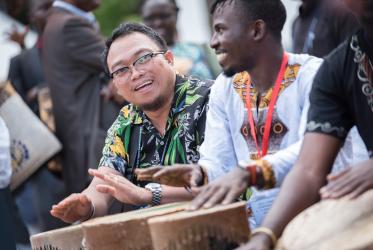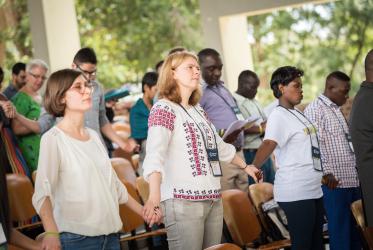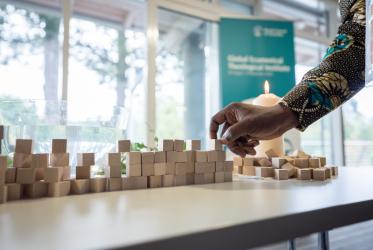Eighteen theological educators and church representatives gathered on 22 June in Geneva for the second meeting of the Network of Institutions of Higher Ecumenical Theological Education (NIHETE). The inaugural meeting took place in Halle, Germany, in May 2016. NIHETE is an open platform of exchange on contents, methodologies and contexts of teaching ecumenism in the era of world Christianity.
At its inception NIHETE understood itself as a sounding board and reference group in support of the preparations towards the Global Ecumenical Theological Institute (GETI) 2018 in Arusha.
Members of NIHETE assisted in the dissemination of GETI 2018 related information within their regions and institutions, took part in selection of participants, made proposals for academic facilitators, and advised on study resources.
“GETI 2018 in Arusha would not have been implemented without NIHETE and the collegial bonds it created across the regions and confessional traditions,”said AméléEkué, professor of Ecumenical Ethics at the Ecumenical Institute Bossey and programme executive for Ecumenical Theological Education, the World Council of Churches (WCC) project in which NIHETE is lodged.
The June meeting in Geneva was an opportunity to look back, take stock of the achievements, and reflect on future areas of engagement. Participants discussed, among other issues, how the energy of a vibrant GETI 2018, and important lessons learnt on the way, can be made fruitful for the next similar event.
The participants in the NIHETE meeting developed a strategy on how to reach out to GETI 2018 participants to collect their views on the creation of an alumni network.
Fernando Enns, professor of Peace Theology and Ethics at the Vrije University of Amsterdam, member of the WCC Central Committee and co-moderator of the WCC Reference Group on the Pilgrimage of Justice and Peace, pointed to the inspiration emerging theologians can provide for “broadening perspectives on other ways of doing theology in the ecumenical space.”
Along these lines of thought they also reflected upon ways in which NIHETE can contribute to future ecumenical events, such as the WCC Assembly 2021 in Karlsruhe, by offering proposals for inviting and intergenerational models of ecumenical learning.
Rudolf von Sinner, professor of Systematic Theology, Ecumenism and Interreligious Dialogue at the Faculdades EST in Brazil and co-moderator of the WCC Commission on Ecumenical Education and Formation (CEEF), remarked that NIHETE is also important in order to “discern how we locate ecumenical formation in the public space, especially with the presence of new, mainly Evangelical and Pentecostal, institutions claiming influence in the domain.”
For him as for Rev. Dr Angelique Walker-Smith, WCC Central Committee and CEEF member, NIHETE bears the potential “to highlight burgeoning places of theological education, such as the Pan African Women’s Ecumenical Empowerment Network, at the intersection of advocacy and ecumenical formation in this kairosmoment of the ecumenical history.”
The meeting has contributed to evaluate experiences since Halle and to discern the way ahead together around key issues of theological education.
The attendants agreed that the network should continue to grow, position itself as a space to discern difficult issues and consider ways to deal with them theologically and didactically. Together they invite all theological educators whose hearts beat for ecumenism to join NIHETE and to continue the conversation.
Links:
Learn more about the WCC's programme on Ecumenical Theological Education







